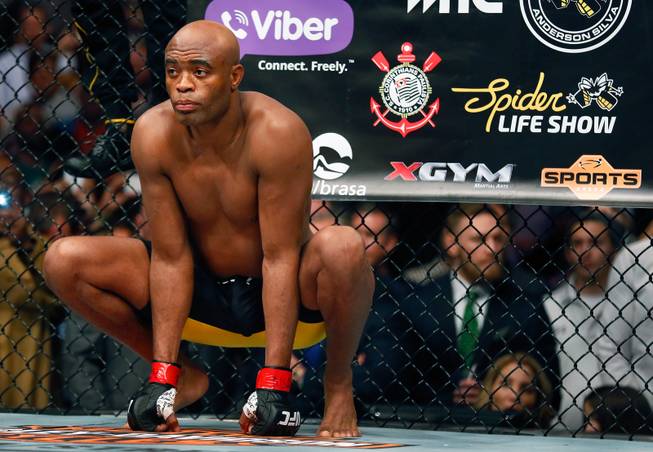
Middleweight Anderson Silva does his spider pose before taking on Nick Diaz in their fight at the MGM Grand Garden Arena on Saturday, January 31, 2015. L.E. Baskow
Wednesday, Feb. 18, 2015 | 3:45 p.m.
A rash of positive drug tests resulted in the UFC taking a publicity bashing over the last month.
The locally based mixed martial arts promotion struck back Wednesday morning at a press conference held at Red Rock, unveiling a remedy to what’s perceived as a rampant problem in the sport. UFC Chief Executive Officer Lorenzo Fertitta, President Dana White and Chief Operating Officer Lawrence Epstein announced a “call to action” in the form of a new comprehensive drug-testing program.
“It is our belief that this plan will drive us to make this sport safer and allow our athletes to compete on an even playing field,” Fertitta said. “By doing so, we will not only be a leader in mixed martial arts but also in the world of professional sports.”
If the UFC sticks to the guidelines of the presentation, it will have the strictest rules on performance-enhancing drug of any professional sport. The proposal is highlighted by an initiative to test all of the approximately 585 fighters on the roster out of competition at random intervals.
It also includes post-fight drug tests for every fighter, and an enhanced testing regimen ahead of main events and championship fights. The UFC hopes to work with state athletic commissions to make penalties for a failed test harsher, perhaps raising the current standard of a nine-month suspension for first-time offenders to as much as two- to four-year ban.
The plan goes into effect on July 1.
“That certainly doesn’t mean that up until that point, there won’t be out of competition testing,” Fertitta stressed. “There will be. In order for us to put this structure in place, it’s going to take us some time.”
White promised the UFC would spearhead increased testing in 2013, which is when Fertitta said the UFC began exploring options, but backed off the idea before last month’s UFC 182.
That was the event where an out of competition test revealed light heavyweight champion Jon Jones had taken cocaine. Steroids were detected in fellow main-card victor Hector Lombard’s system.
Perhaps the only man considered more accomplished than Jones in the UFC, former middleweight champion Anderson Silva, failed both a pre- and post-fight exam for steroids at UFC 183 four weeks later.
Fertitta said all the failures took away the UFC’s “luxury of sitting back, being academic,” about what they wanted to implement.
“When a guy like Anderson Silva gets caught, it definitely sends a message,” White emphasized. “I think that shocked the entire MMA community and sports world. It definitely shocked me. We were pretty blown away by it, and now we’re going to dig in.”
The most pressing decision the UFC will need to make is which anti-doping agency it will employ to administer the tests. Fertitta reported the promotion had spoken to several, but confidentiality agreements precluded him from sharing anything more.
The UFC contributed $500,000 to athletic commissions for out of competition testing in the last year, according to Fertitta, and five out of 19 fighters failed on verified occasions.
Fertitta knows the price will bloat to millions extending the scrutiny to all fighters, and fears the number of positive tests will follow course.
“Honestly, it’s going to probably get worse before it gets better but we have to put these procedures in place to eventually make it better,” Fertitta said. “It could be a bumpy road but we’re committed to making this happen.”
The UFC must work with the state governments and international sanctioning bodies regulating mixed martial arts to ensure the changes clean up the sport.
Another challenge is the fighters’ statuses as independent contractors and not employees, making the drug testing more difficult to implement compared to other professional sports.
The obstacles are numerous, but the UFC believed waiting was no longer an option — not after the last month.
“I hate everything about it,” White said of performance-enhancing drugs. “If you can’t compete in this sport with your natural abilities, you don’t belong here.”
Case Keefer can be reached at 948-2790 or [email protected]. Follow Case on Twitter at twitter.com/casekeefer.

Join the Discussion:
Check this out for a full explanation of our conversion to the LiveFyre commenting system and instructions on how to sign up for an account.
Full comments policy